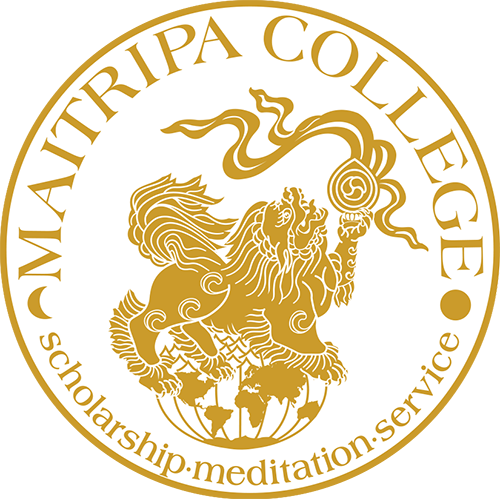Conflict of Interest Policy
Maitripa College administrators, faculty, and staff shall not participate in institutional decisions involving direct benefits such as appointments, retentions, promotions, salaries, leaves of absence, or awards to members of their immediate families.
The principle of anti-nepotism shall not be used as a criterion against appointment or employment at Maitripa.
Maitripa shall conduct its affairs so that no member of the community shall derive private gain from his or her association with the college except as provided by explicit policies of the college.
Consensual Relationships Policy
Institutional Commitment
This policy upholds Maitripa College’s mission to foster a community rooted in integrity, mutual respect, and ethical conduct. This policy reflects the College’s dedication to maintaining a community where relationships are grounded in transparency, accountability, and respect for institutional and religious values.
Prohibited Relationships
Faculty/Staff and Students
- Romantic or sexual relationships are prohibited between employees (faculty, staff, volunteers) and students under their direct supervision, instruction, or academic evaluation.
- Exceptions: Pre-existing relationships must be disclosed immediately to Human Resources (HR) or the Office of Academic Affairs to facilitate reassignment of supervisory and evaluative roles.
Supervisor-Subordinate Employees
- Relationships are prohibited between employees where one holds evaluative, supervisory, or hiring authority over the other.
- If a relationship develops, the superior must disclose it to HR to remove conflicting responsibilities.
Clergy and Congregational Roles
- Employees in ministerial or pastoral roles (e.g., chaplains, counselors) are prohibited from relationships with students or community members they advise spiritually.
Mandatory Disclosure
- Employees and students must report prohibited or high-risk relationships to HR or a designated ethics officer.
- Failure to disclose may result in disciplinary action, including termination of employment.
Mitigation Measures
- Academic/employment adjustments: Supervisors must create written plans to eliminate conflicts (e.g., transferring oversight, altering teaching assignments).
- Recusal: Individuals in prohibited relationships must avoid decisions impacting the other party (e.g., grading, promotions).
Support and Confidentiality
- Concerns may be submitted to Maitripa College as outlined in Maitripa College’s Safeguarding Students Policy and Reporting Procedures.
- The college will provide faith-based counseling to affected parties while maintaining confidentiality.
Training and Education
- Annual training for faculty, staff, and students on identifying and reporting conflicts.
- Integration of this policy into new employee orientation and student handbooks.
Non-Retaliation
- Retaliation against individuals who report concerns is strictly prohibited and may result in disciplinary action.
Consequences for Violating a College’s Consensual Relationship Policy
Violating Maitripa College’s consensual relationship policy can result in a range of disciplinary actions, depending on the severity and context of the violation. These consequences are designed to protect the integrity of the educational environment, uphold professional standards, and minimize conflicts of interest and potential harm to students and employees. Consequences may include:
Disciplinary Action (Up to Dismissal)
- Individuals found to be in violation of the policy may face disciplinary measures ranging from formal warnings and reprimands to suspension or dismissal (termination of employment or expulsion for students).
- Dismissal is typically reserved for the most serious or repeated violations, such as ongoing undisclosed relationships or those involving clear abuses of power.
Removal or Reassignment of Duties
- The college may remove the violator from any supervisory, evaluative, or instructional role over the other party involved in the relationship.
- In some cases, reassignment or restructuring of job duties may be used as a corrective measure, especially if the relationship is disclosed after it has begun.
Separate Violations for Non-Disclosure
- Failing to report a prohibited or high-risk relationship is itself a violation and can lead to additional disciplinary action, even if the relationship would otherwise be permitted under disclosure rules.
Investigation and Documentation
- Violations are typically investigated by Human Resources or a designated college office. The investigation may include reviewing all relevant information, and findings may be documented in personnel or student files.
Impact on Professional Reputation
- Even beyond formal discipline, violating the policy can damage an individual’s professional reputation, undermine trust within the college community, and potentially lead to legal liability for the college or individuals involved.
- This policy is reviewed annually and updated as necessary to reflect best practices and the evolving needs of our community.
Sexual Misconduct Policy
This policy affirms Maitripa College’s commitment to providing a safe, respectful, and compassionate environment, rooted in Buddhist ethical principles of non-harming, respect, and the dignity of all beings. Sexual misconduct is strictly prohibited and will not be tolerated in any form. This policy applies to all members of the college community, including students, faculty, staff, volunteers, and visitors, regardless of gender identity or sexual orientation.
Definitions
Sexual Misconduct includes, but is not limited to:
- Sexual harassment (unwelcome sexual advances, requests for sexual favors, or other verbal/physical conduct of a sexual nature)
- Sexual assault or any non-consensual sexual contact
- Coercion or manipulation to obtain sexual favors
- Any sexual activity without clear, enthusiastic, and ongoing consent
- Exploitative relationships, especially those involving power differentials (e.g., teacher-student, supervisor-subordinate)
Consent is a clear, voluntary, and affirmative agreement to engage in specific sexual activity. Consent cannot be obtained through force, intimidation, coercion, or when a person is incapacitated.
Special Considerations in Buddhist Context
The teacher-student relationship is recognized as a sacred bond based on trust, respect, and the student’s spiritual well-being. Any sexual relationship between teachers and students is strictly prohibited, regardless of perceived consent, due to inherent power imbalances and the potential for harm. The college upholds the Buddhist precept to “abandon sexual misconduct,” emphasizing non-harming and mutual respect in all interactions.
Zero Tolerance for Abuse
- The college maintains a zero-tolerance policy for all forms of abuse, including sexual, emotional, physical, financial, and psychological abuse.
- Any behavior that is exploitative, coercive, or an abuse of power is strictly forbidden and grounds for disciplinary action, including dismissal from the college or revocation of teaching authority.
Reporting and Response
- Any member of the community who experiences or witnesses sexual misconduct is strongly encouraged to report the incident as outlined in Maitripa College’s Safeguarding Students Policy and Reporting Procedures.
- Reports will be handled promptly, confidentially, and with compassion for all parties involved.
- Retaliation against individuals who report misconduct or participate in investigations is strictly prohibited and will result in additional disciplinary action.
Investigation and Resolution
- All reports of sexual misconduct will be investigated thoroughly and impartially.
- The college will take steps to end the misconduct, prevent its recurrence, and address its effects on the survivor and the community.
- Sanctions for violations may include warnings, suspension, expulsion, termination of employment, or revocation of teaching authorization.
Education and Prevention
The college will provide ongoing education and training to all staff and students on sexual misconduct prevention, consent, and healthy boundaries, with attention to the unique dynamics of Buddhist teacher-student relationships.
Support and Resources
- Survivors of sexual misconduct will have access to counseling, spiritual support, and external resources as needed.
- The college is committed to fostering a culture of safety, transparency, and respect, in alignment with Buddhist values and ethical standards.
This policy is reviewed annually and updated as necessary to reflect best practices and the evolving needs of our community.


